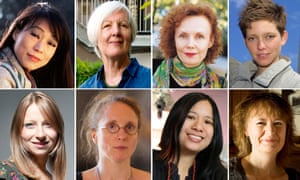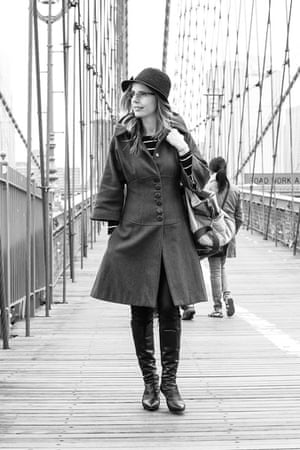Women composers: genius is gender blind – and so should we be
Skip to main content
Music blog
Classical music
Women composers: genius is gender blind – and so should we be
Classical music’s past might be dominated by men, but we can ensure its future isn’t. I’m delighted to be part of Radio 3’s International Women’s Day celebrations

Contemporary female composers whose music will be celebrated on Radio 3: (top row, l-r) Unsuk Chin, Judith Weir, Kaija Saariaho, Tansy Davies; (bottom row) Charlotte Bray, Rebecca Saunders, Liza Lim and Sally Beamish.
Photograph: Guardian
Someone asked me the other day if the reason there are fewer women composers represented at the highest level was that male composers were simply better. My response was unrepeatably rude. Frankly, it’s too ludicrous a question to validate with a polite answer. My litmus test for those kinds of comments is this: replace “female” with “black”, and “male” with “white”. Now put the question to me again, and see how comfortable you feel asking it.
I’m a committed feminist, I have a misogyny detector permanently clamped to my eyes and ears – I’m highly sensitive to gender discrimination because it’s just plain wrong. I also love classical music.
My professional life is largely dedicated to the veneration of art created over the last few hundred years almost exclusively by men – wonderful, brave, talented, soul-searching men who found ways to touch hearts and open minds to the rich complexity of the human experience.
So it’s with particular pleasure that I’m taking part in Radio 3’s International Women’s Day celebrations on 8 March, a whole day of music dedicated to women set within two weeks’ complementary programming. And it’s with immense satisfaction and fascination that I’ve spent the last year nosing around the creative spaces of living composers, 40% of whom are women, in my series Composers’ Rooms. Would the person who asked the stupid question please listen to the series and then get back to me? What they will discover is that women and men are equal when it comes to creativity.
But still, the stupid question was prompted by a serious issue: it’s true that female composers are less well represented at the highest level in the UK than their male counterparts. Concert halls, orchestras and publishers all need to take a long hard look at their statistics. In a special feature for Radio 3’s Music Matters on 7 March, I’ll be addressing the thorny issue of the lack of women composers on publishers’ lists. Jessica Duchen, in her excellent and impassioned article on the subject, mentioned the appalling statistics we found when researching the piece, with not one publisher we spoke to managing to peak above 17% women on their books.
But I also discovered three things that made me feel better about that disparity. One, the industry as a whole is starting sincerely to address the gender issue in a variety of ways; two, the gender inequality on publishers’ lists doesn’t reflect the numbers of women who are actually out there writing music; and three, there are now more female role models in composition than ever before, which can only be a good thing.

On International Women’s Day itself, I’ll be hosting a special edition of The Choir, including the world premiere of a new choral work by Rhiannon Randle. The following week, Radio 3 has five composers of the week, all young women working today: Anna Clyne, Charlotte Bray, Cheryl Frances-Hoad, Hannah Kendall and Dobrinka Tabakova.
I wonder if one of the reasons I’ve always been passionate about contemporary music is because I see my gender better represented there than in the past 400 years of music history, now that women finally have the opportunity to compose. A great number of the living creators whose music moves, enthrals, delights and inspires me are women: Kaija Saariaho, Rebecca Saunders, Tansy Davies, Unsuk Chin and Liza Lim. Genius, thank goodness, is gender blind.


 Clash Royale CLAN TAG
Clash Royale CLAN TAG
View all comments >